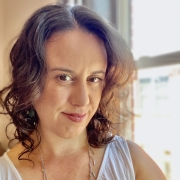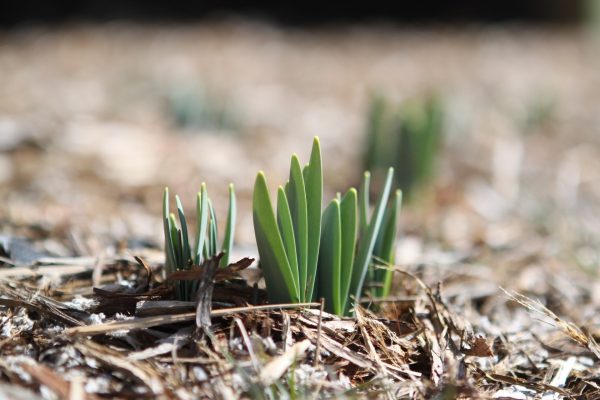The Art of Suffering Inspired by Etty Hilesum, Let by Hila Ratzabi from Reconstructing Judaism on Vimeo.
Transcription: Hi, I’m Hila Ratzabi, and this is “The Art of Suffering,” a practice inspired by Etty Hillesum. Etty Hillesum was a Dutch Jewish writer whose Holocaust diaries and letters reveal profound spiritual wisdom relevant to our times. I’m honored to lift up her voice and share her words of healing and love.
We’re going to read some quotations by Etty Hillesum about suffering, followed by a practice that will invite you to sit with something painful in your life. It will be short, as I don’t want us to dwell for too long in that space, but if you feel that this isn’t safe or appropriate for you right now, please don’t do the practice. You can skip the practice part and simply read and listen to the quotes instead. After that section, we’ll move on to more quotations and reflection questions.
“Suffering is not beneath human dignity. I mean: it is possible to suffer with dignity and without. I mean: most of us in the West don’t understand the art of suffering and experience a thousand fears instead. We cease to be alive, being full of fear, bitterness, hatred, and despair.”
“One moment it is Hitler, the next it is Ivan the Terrible; one moment it is Inquisition and the next war, pestilence, earthquake, or famine. Ultimately what matters most is to bear the pain, to cope with it, and to keep a small corner of one’s soul unsullied, come what may.”
Practice: Make space for sorrow
“Give your sorrow all the space and shelter in yourself that is its due, for if everyone bears his grief honestly and courageously, the sorrow that now fills the world will abate. But if you do not clear a decent shelter for your sorrow, and instead reserve most of the space inside you for hatred and thoughts of revenge – from which new sorrows will be born for others – then sorrow will never cease in this world and will multiply.”
Etty Hillesum affirms that we need to make space for pain and sorrow. This is counterintuitive. When we hurt, we want to heal; but so often we seek healing by turning away from our pain instead of toward it. By clearing space for that pain it can transform into something different, something useful, perhaps.
Where are you experiencing suffering in your life right now? Choose the thing that first comes to mind that hurts the most. Can you hold this for just a moment and imagine making space around that feeling? Can you imagine perhaps placing that feeling or image in a field, seeing it as something small in the landscape of your life? Can you walk around the feeling or image, feel some air, perhaps a slight breeze, in the space between you and the pain?
We won’t sit for too long in this space, but it’s a practice you can return to as you learn to work with your responses to suffering. In these next quotations we’ll see how Etty imagined suffering as something that can be useful for our lives, if we learn to approach it differently.
Writing/reflection prompt
“The idea of suffering (which is not the reality, for real suffering is always fruitful and can turn life into a precious thing) must be destroyed. And if you destroy the ideas behind which life lies imprisoned as behind bars, then you liberate your true life, its real mainsprings, and then you will also have the strength to bear real suffering, your own and the world’s.”
How can suffering be fruitful?
How can suffering turn life into a “precious thing”?
What kinds of ideas “imprison” life?
Can you imagine liberating your “true life”? What does that look like?
“The realms of the soul and the spirit are so spacious and unending that this little bit of physical discomfort and suffering really doesn’t matter all that much. I do not feel I have been robbed of my freedom; essentially no one can do me any harm at all.”
 Hila Ratzabi is a poet, essayist, writing coach, and editor. Her essays have been published in the Forward, Alma, MyJewishLearning, Kveller and elsewhere. Her poetry has been published widely in literary journals and in The Bloomsbury Anthology of Contemporary Jewish American Poetry and Ghost Fishing: An Eco-Justice Poetry Anthology. Ratzabi holds an MFA in Poetry from Sarah Lawrence College, a BA in English from Barnard College and a BA in Jewish Philosophy from List College at the Jewish Theological Seminary. She is the Executive Editor of Ritualwell.org, and lives in Oak Park, IL.
Hila Ratzabi is a poet, essayist, writing coach, and editor. Her essays have been published in the Forward, Alma, MyJewishLearning, Kveller and elsewhere. Her poetry has been published widely in literary journals and in The Bloomsbury Anthology of Contemporary Jewish American Poetry and Ghost Fishing: An Eco-Justice Poetry Anthology. Ratzabi holds an MFA in Poetry from Sarah Lawrence College, a BA in English from Barnard College and a BA in Jewish Philosophy from List College at the Jewish Theological Seminary. She is the Executive Editor of Ritualwell.org, and lives in Oak Park, IL.











